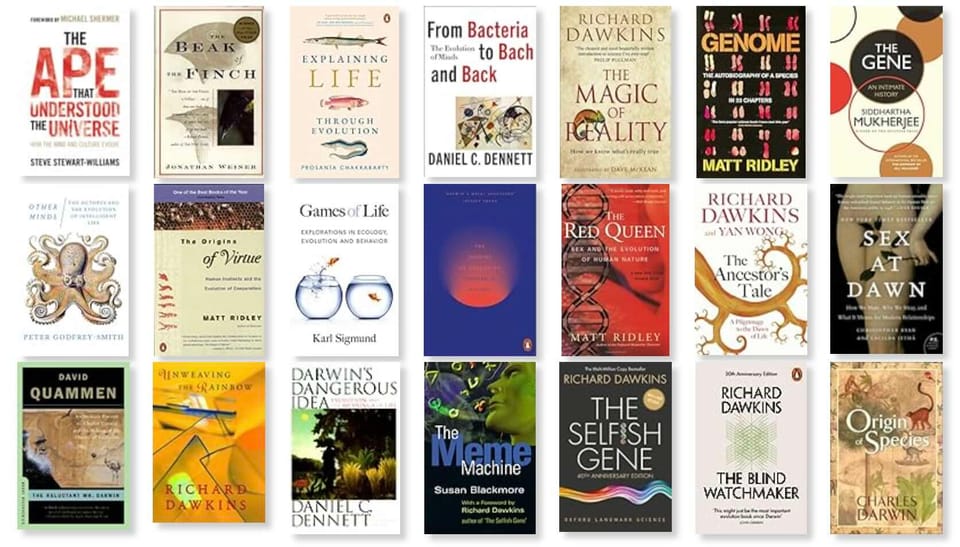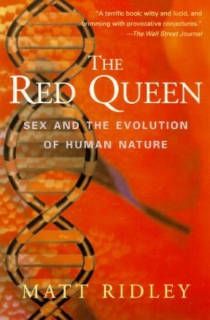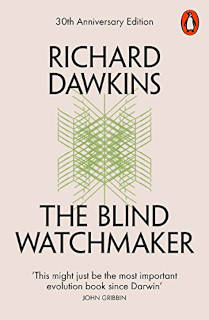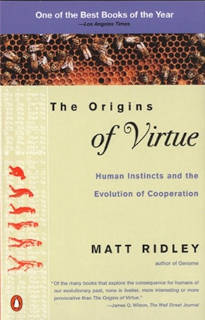Recommended Readings in Evolutionary Biology

(This post is a companion to the essay: Investing Lessons from Evolutionary Biology)
Investing literature was all about finance till ten years back. Then came the works of Daniel Kahneman and Richard Thaler that started the trend of understanding psychology to become better investors.
Similarly, it is my belief that in the coming years the field of evolutionary biology (and associated areas of evolutionary game theory, neuroscience) will be closely studied by investors to better position their portfolios.
Check what Josh Wolfe, investor at Lux Capital, reads.
A few BOOKS 📚 I recommend—highly...
— Josh Wolfe (@wolfejosh) January 12, 2021
Some more obscure. pic.twitter.com/Y9TIfn82Ps
And this is author and market strategist Michael Mauboussin of Morgan Stanley.
* The Blind Watchmaker: Why the Evidence of Evolution Reveals a Universe Without Design by @RichardDawkins
— Michael Mauboussin (@mjmauboussin) April 4, 2023
* Darwin's Dangerous Idea: Evolution and the Meanings of Life by @danieldennett
* The Righteous Mind: Why Good People Are Divided by Politics and Religion by @JonHaidt
These are some of the books that I have enjoyed reading and that have helped me form a layman understanding of this area.
The Selfish Gene – Richard Dawkins (1974)

This 1974 book literally started the genre of evolutionary biology. Here, Dawkins introduces the idea of the gene as a master replicator, that has been on a journey from time immemorial, jumping from body to body, across generations, and that our bodies are just vehicles to carry the genes and transmit them.
The Selfish Gene was adjudged the best science book of the last 30 years by the Royal Society.
The Selfish Gene.
— Paul Graham (@paulg) December 12, 2020
The Red Queen : Sex and the Evolution of Human Nature – Matt Ridley (1993)

The title refers to the Red Queen in Alice in Wonderland, who advises Alice to keep running to stay in the same place. Ridley explains how each species is in a constant arms race with its predator and prey. This fascinating book explains how sex (and the associated random gene mixing and recombination) is our defence against parasites and viruses.
The Social Conquest of Earth – EO Wilson (2012)

While Dawkins dwelled on the selfishness of the gene, Wilson challenges this notion and suggests that it is group-selection and our ability to stay in groups that has led to the human progress and is also responsible for the unique “human condition” — the ever present inner conflict in the individual between his own selfish needs and those of family and community.
Darwin’s Dangerous Idea: Evolution and the Meanings of Life – Daniel Dennett (1995)

This slightly nerdy book explains evolution as simply a mindless algorithm, just as the process of division in arithmetic. There is no purpose or goal to evolution and no need for us to look for an intelligent designer. Humans just happen to be the (current) winners of an evolutionary coin-tossing tournament.
The Blind Watchmaker – Richard Dawkins (1986)

Even with an understanding of evolution, it is difficult to let go of the Creator explanation, as our minds cannot grasp how life must have started in the first place. Dawkins explains how evolution can build complex bodies and features in trials and errors, without the need of any master designer.
The Origins of Virtue: Human Instincts and the Evolution of Cooperation – Matt Ridley (1996)

This book explores why the inherently selfish individual human being has evolved to become a co-operative group member. Being in a group and trusting one another are not incompatible with our self-interest and have allowed us to create complex societies, culture and markets.

Member discussion